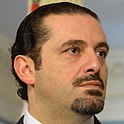
Back رفيق الحريري Arabic رفيق الحريرى ARZ Rəfiq Həriri Azerbaijani رفیق حریری AZB Рафик Харири Bulgarian রফিক হারিরি Bengali/Bangla Rafik Hariri Catalan ڕەفیق حەریری CKB Rafík Harírí Czech Rafik Hariri Danish
Rafic Hariri | |
|---|---|
رفيق الحريري | |
 Hariri in 2004 | |
| Prime Minister of Lebanon | |
| In office 23 October 2000 – 21 October 2004 | |
| President | Émile Lahoud |
| Deputy | Issam Fares |
| Preceded by | Salim Al-Huss |
| Succeeded by | Omar Karami |
| In office 31 January 1992 – 2 December 1998 | |
| President | Elias Hrawi Émile Lahoud |
| Deputy | Michel Murr |
| Preceded by | Rachid Solh |
| Succeeded by | Salim Al-Huss |
| Minister of Finance | |
| In office 31 October 1992 – 4 December 1998 | |
| Prime Minister | Himself |
| Preceded by | Asaad Diab |
| Succeeded by | Georges Corm |
| Member of Lebanese Parliament | |
| In office 20 October 1992 – 14 February 2005 | |
| Succeeded by | Saad Hariri |
| Constituency | Beirut |
| Personal details | |
| Born | Rafic Bahaa El Deen Al Hariri 1 November 1944 Sidon, Lebanon |
| Died | 14 February 2005 (aged 60) Beirut, Lebanon |
| Manner of death | Assassination |
| Nationality | Lebanese and Saudi Arabian |
| Political party | Future Movement |
| Spouse(s) | Nidal Bustani Nazik Hariri |
| Children | Bahaa, Saad, Houssam, Ayman, Fahd, Hind |
| This article is part of a series on |
| Hariri family |
|---|
 |
Rafic Bahaa El Deen al-Hariri[a] (Arabic: رفيق بهاء الدين الحريري, romanized: Rafīq Bahāʾ ad-Dīn al-Ḥarīrī, Lebanese Arabic pronunciation: [raˈfiːʔ ɪlħaˈriːri]; 1 November 1944 – 14 February 2005) was a Lebanese businessman and politician, who served as the Prime Minister of Lebanon from 1992 to 1998 and again from 2000 until he resigned on 20 October 2004, before his assassination in 2005.
Hariri headed five cabinets during his tenure. He was widely credited for his role in constructing the Taif Agreement that ended the 15-year Lebanese Civil War. He also played a huge role in reconstructing the Lebanese capital, Beirut. He was the first post-civil war prime minister and the most influential and wealthiest Lebanese politician until his assassination. During Hariri's first term as prime minister, tensions between Israel and Lebanon increased, as a result of Qana massacre. In 2000, when he became prime minister for second time, the biggest achievement during his time as prime minister was the Israeli withdrawal from Southern Lebanon, ending an 18-year old occupation. Meanwhile relations with Syrian President Bashar increased.
Hariri was assassinated on 14 February 2005 by a suicide truck bomb in Beirut. Four Hezbollah members were indicted for the assassination and are being tried in absentia by the Special Tribunal for Lebanon, but others have linked the assassination to the Syrian government. The outcome of a 15-year investigation led to the guilty verdict of multiple people in Hezbollah's party taking part; however, the only one left alive would be Salim Ayyash, a well-connected, mid-level operative in Hezbollah.[1] The assassination was a catalyst for dramatic political change in Lebanon. The massive protests of the Cedar Revolution helped achieve the withdrawal of Syrian troops and security forces from Lebanon and a change in government.
At one point, Hariri was one of the world's 100 wealthiest men[2] and the fourth-richest politician.[3]
Cite error: There are <ref group=lower-alpha> tags or {{efn}} templates on this page, but the references will not show without a {{reflist|group=lower-alpha}} template or {{notelist}} template (see the help page).
- ^ "Rafik Hariri tribunal: Guilty verdict over assassination of Lebanon ex-PM". BBC News. 18 August 2020.
- ^ "Rafik Hariri: Billionaire politician". BBC. Retrieved 18 August 2020.
- ^ "Forbes says Hariri ranks fourth among wealthy politicians". The Daily Star. Retrieved 18 August 2020.



